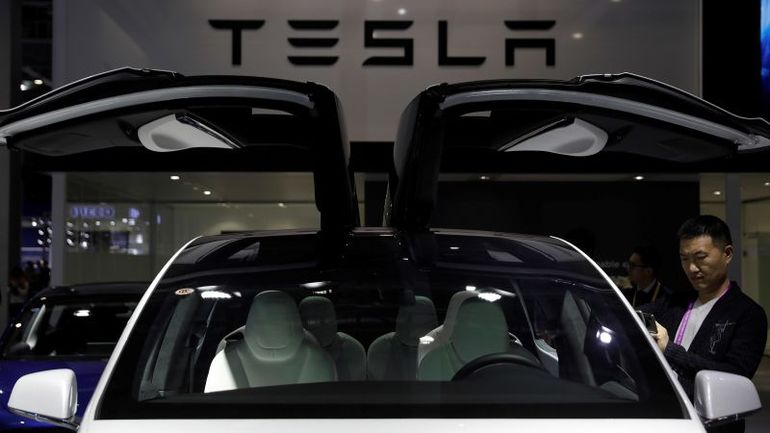
Tesla's Shanghai Battery Factory Amid Growing Trade Tensions

Amid rising trade tensions, Tesla initiated the construction of a massive battery factory in Shanghai, following a recent visit by CEO Elon Musk to boost the company's sales in China. The groundbreaking ceremony took place on Thursday, signaling Tesla's commitment to expanding its manufacturing capabilities in the region.
Tesla started construction on a new manufacturing plant in Shanghai. This comes shortly after CEO Elon Musk's unexpected trip to China to boost the company's declining sales.
The factory, first announced in April of last year, is set to start production in the first quarter of 2025. It is projected to produce 10,000 Megapacks annually. Megapacks are massive batteries designed to store large amounts of electricity. This information was disclosed by Lingang Group, the government-owned entity responsible for developing the area where the plant is located.
The battery facility will be located near Tesla's Shanghai Gigafactory, the company's largest plant outside the United States, where almost one million cars are produced annually.
Megapacks are designed to assist in stabilizing energy grids. According to the company, each unit has the capacity to store enough energy to power 3,600 homes for one hour. They are intended for use by utilities and power stations.
The $200 million project shows Tesla's dedication to China, the biggest market for electric vehicles and the main export location for Tesla cars, amid increasing tensions between Beijing and Washington. This project is seen as a significant achievement for Tesla, according to Tom Zhu, senior vice president of the company.
Rising tensions
While most Western companies are face rising barriers to doing business in China, things have been smoother for Tesla.
Shanghai announced on Friday that it only took a month for both sides to negotiate and finalize a deal to construct a factory near Tesla's Gigafactory. The company demonstrated a similar speed in building their first factory in 2019.
During the commencement ceremony on Thursday, Wu Xiaohua, a Shanghai government official, mentioned that the city would support Tesla in completing the construction and getting the factory up and running "as early as this year."
Elon Musk recently met with Chinese premier Li Qiang during his visit at the end of last month. Li commended Tesla as a "successful model" for collaboration between the United States and China.
In response to a property-induced economic slowdown, Beijing has been increasing efforts to boost electric vehicle (EV) production and promote a low carbon economy. While domestic demand is decreasing, manufacturers are being urged to explore new opportunities for growth in international markets.
That puts the industry at the heart of growing trade tensions with the US and Europe.
Janet Yellen (left) arrived in Guangzhou on Thursday.
Janet Yellen (left) arrived in Guangzhou on Thursday.
Pedro Pardo/AFP/Getty Images
Related article
Janet Yellen tackles China over flood of cheap goods
Earlier this month, President Joe Biden announced that tariffs on $18 billion worth of imports from China, including electric vehicles (EVs) and other products, will increase significantly over the next two years.
Specifically, tariffs on Chinese EVs will rise from 27.5% to 100%, a move aimed at addressing China's strategy of promoting low prices for domestic EVs while imposing a 40% tariff on American car imports.
The White House explained that the actions taken were aimed at safeguarding American workers and businesses from China's unfair trade practices, such as flooding the global markets with exports at artificially low prices.
In a statement made in January, Musk warned that Chinese EV manufacturers could potentially drive many of their competitors out of business if tariffs were not increased.
Elon Musk expressed his concern about the impact of trade barriers on other car companies during an earnings call with analysts. He believed that without these barriers, Tesla could potentially outperform most competitors globally.
However, at a tech conference in Paris, Musk changed his stance and spoke against market-distorting measures. He emphasized the importance of a fair and competitive market for all companies.
Musk expressed his surprise at the announcement of tariffs during VivaTech 2024 via video link, as reported by Reuters. He mentioned that neither Tesla nor himself had requested these tariffs.
He also pointed out that Tesla is able to compete effectively in the Chinese market without tariffs or special support. Musk stated his preference for no tariffs in general.
Editor's P/S:
Tesla's decision to expand its operations in China, despite rising tensions between Beijing and Washington, reflects the company's commitment to the world's largest electric vehicle market. The construction of a new Megapack manufacturing plant near the Shanghai Gigafactory underscores Tesla's confidence in the growth potential of the Chinese market, where demand for electric vehicles remains strong despite economic headwinds. The project also highlights the company's ability to navigate the complex geopolitical landscape and maintain a positive relationship with Chinese authorities.
While Tesla has faced scrutiny over its reliance on China, the expansion of its manufacturing presence in the country aligns with its broader goal of transitioning the world to sustainable energy. Megapacks play a crucial role in grid stabilization and the integration of renewable energy sources, which will be essential for achieving a carbon-neutral future. By investing in the production of these massive batteries in China, Tesla is not only contributing to the growth of the local EV industry but also supporting the global transition to cleaner energy.














